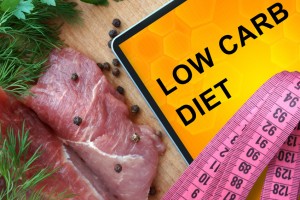Low-carb diets are said to be beneficial regarding weight loss. Unfortunately, many of the negative side effects associated with a low-carb diet outweigh the positives. Conventional diets may be more optimal compared to a diet that is extremely low in carbohydrates.
Maintaining Muscle on a Low-Carb Diet
Maintaining muscle is immensely difficult while on a low-carb diet. Carbohydrates are the body’s number one source of energy. While it is true your protein intake will likely be higher on most low carb-diets, protein is primarily used for building and maintaining muscle. On a low-carb diet, you may lose muscle because your protein is being used as energy instead of it being used for maintaining muscle mass. For example, you may lose fat, but you are likely to lose muscle mass as well.
In addition, it will be much more difficult to have the energy to exercise when on a low-carb diet. Being on a low-carb diet for an extended period of time will cause glycogen to deplete from muscles. Depleted glycogen levels will cause you to have less energy when exercising. The reduced energy will negatively affect cardiovascular performance and resistance training performance. As a result, you may lose power, strength, speed, and muscle.
Saturated Fat
Nearly all low-carb diets allow you to eat foods that are higher in fat content. Foods higher in fat content include steak, cheese, and milk. Although steak, cheese, and milk are also high in protein, the saturated fat content is quite high. People may be motivated to eat more meat and dairy, which may cause them to eat more saturated fat than they need per day. Too much saturated fat can raise cholesterol levels. Additionally, the risk of developing cardiovascular disease is increased.
Fiber Content
Many foods that are high in carbohydrates are also high in fiber. You may not get adequate amounts of fiber, which could lead to constipation, because fiber maintains proper bowel function. Whole grain bread, for example, is high in fiber, but on a low-carb diet, you are restricted from eating whole grain bread because of its high carbohydrate content.
Weight Loss
Although low-carb diets can help you lose fat, most of the weight loss will be from water and glycogen stores. If your goal is to lose primarily fat, other diets may prove more beneficial to you, as a lot of weight loss from low-carb dieting is due to water and glycogen depletion.
Negative Physiological Side Effects
The risk of getting headaches is higher when on a low-carb diet. Dizziness, light-headedness, and general fatigue can also occur. Exercising, in particular, will be considerably more difficult if you suffer from headaches, dizziness, fatigue, and light-headedness when on a low-carb diet.
In short, low-carb diets can potentially have several negative side effects. At the end of the day, you will have to decide whether or not consuming low amounts of carbohydrates is worth it or not. If you want to lose fat low-carb dieting may work, but it may not be optimal compared to a diet that includes more fruit and grain.
